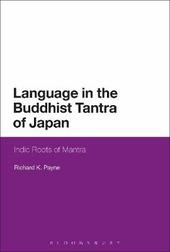
|
Language in the Buddhist Tantra of Japan: Indic Roots of Mantra
Paperback / softback
Main Details
| Title |
Language in the Buddhist Tantra of Japan: Indic Roots of Mantra
|
| Authors and Contributors |
By (author) Richard K. Payne
|
| Physical Properties |
| Format:Paperback / softback | | Pages:256 | | Dimensions(mm): Height 234,Width 156 |
|
| Category/Genre | Philosophy of language
Buddhism |
|---|
| ISBN/Barcode |
9781350152090
|
| Classifications | Dewey:294.3 |
|---|
| Audience | | Tertiary Education (US: College) | |
|---|
|
Publishing Details |
| Publisher |
Bloomsbury Publishing PLC
|
| Imprint |
Bloomsbury Academic
|
| Publication Date |
20 February 2020 |
| Publication Country |
United Kingdom
|
Description
Language in the Buddhist Tantra of Japan dismantles the preconception that Buddhism is a religion of mystical silence, arguing that language is in fact central to the Buddhist tradition. By examining the use of 'extraordinary language'-evocations calling on the power of the Buddha-in Japanese Buddhist Tantra, Richard K. Payne shows that such language was not simply cultural baggage carried by Buddhist practitioners from South to East Asia. Rather, such language was a key element in the propagation of new forms of belief and practice. In contrast to Western approaches to the philosophy of language, which are grounded in viewing language as a form of communication, this book argues that it is the Indian and East Asian philosophies of language that shed light on the use of language in meditative and ritual practices in Japan. It also illuminates why language was conceived as an effective means of progress on the path from delusion to awakening.
Author Biography
Richard K. Payne is Yehan Numata Professor of Japanese Buddhist Studies at the Institute of Buddhist Studies, Graduate Theological Union, Berkeley, USA. He specializes in Japanese tantric Buddhism, particularly its ritual practices, and is co-editor of Homa Variations (2016).
ReviewsPayne has rewritten, expanded upon, and integrated recent research into this monograph. The result is a sleek volume containing critiques of "Buddhist modernism," a sustained investigation of Euro-American philosophy of language, detailed overviews of Indic and East Asian approaches to language, and an exploration of Buddhist epistemology. * Japanese Journal of Religious Studies * Payne brilliantly deconstructs the popular notion of Buddhism being "anti- language" where meditation and silence are perceived as paramount, arguing that language, in fact, plays a pivotal role in Buddhist traditions. ... This book is a must-read for all enthusiasts of Chinese culture, both classical and modern, and a great guidebook for students of twentieth century Chinese social and ethical thought. * Religious Studies Review * This is a magisterial work that brilliantly distils and presents decades of exploring and encountering the nuances and profundity of the "extraordinary language" of Japanese Buddhism. Beautifully and clearly written, this book leads us through a sophisticated and innovative methodology that demonstrates the many dimensions and, above all, uses, of religious language. Richard Payne has provided us with a landmark contribution to Tantric Studies, Buddhist Studies, and Japanese Religion. * Glen Alexander Hayes, Professor of Religion, Bloomfield College, USA * This volume on 'extraordinary language' in different traditions of East Asian Buddhism, with its richly textured case-studies and its theoretical depth, is a brilliant contribution to the study of Buddhist philosophy and practice of language. * Fabio Rambelli, Professor of Japanese Religions and ISF Endowed Chair in Shinto Studies, University of California, USA * Payne's project is an extended meditation on "the transmission of certain ways of thinking about language from India through China to Japan." Examining mantra, dhara?i, Daimoku, Komyu shingon, and ajikan in light of European and Asian theories of language, Payne rejects simplistic reductions of such "extraordinary language" to an apophatic rejection of language and argues that linguistic efficacy is "central to the Buddhist tradition transmitted from South to East Asia. * Charles D. Orzech, Professor of Religious Studies, Colby College, USA *
|